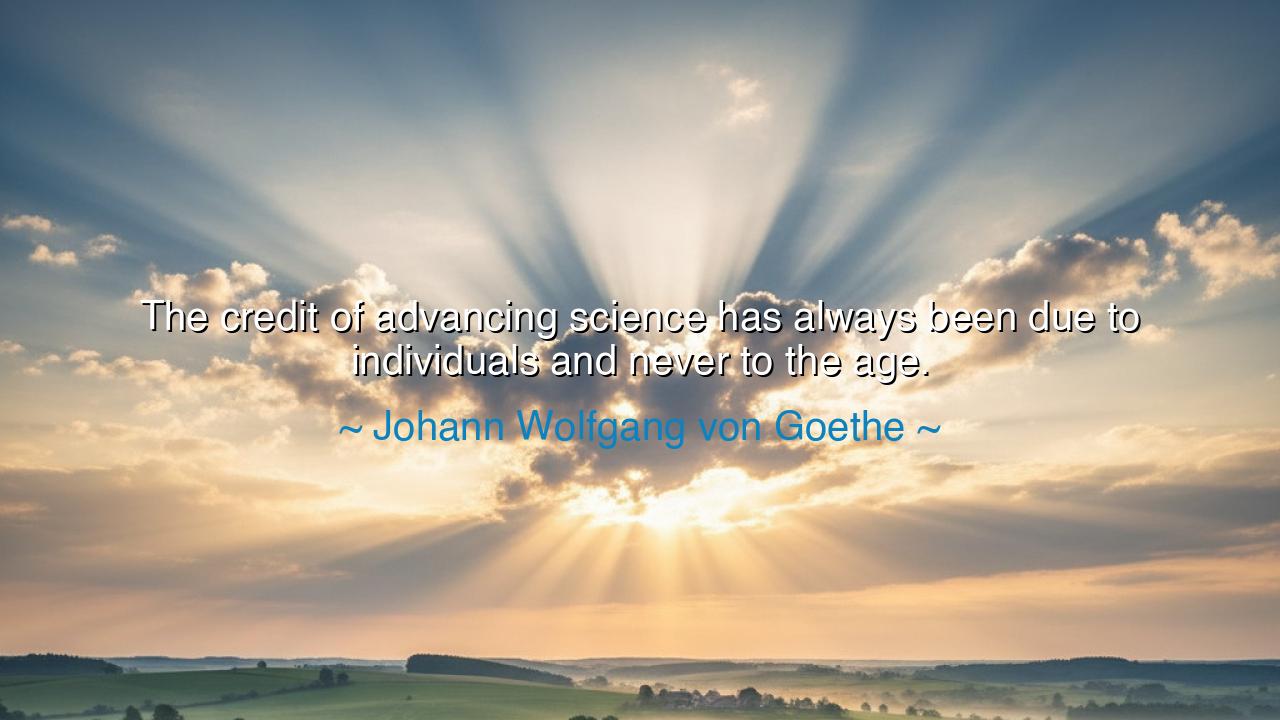
The credit of advancing science has always been due to
The credit of advancing science has always been due to individuals and never to the age.






"The credit of advancing science has always been due to individuals and never to the age." These words, spoken by the wise Johann Wolfgang von Goethe, carry with them a profound recognition of the individual’s role in shaping the course of human progress. Science, in all its grandeur and intricacy, is often seen as a collective effort, a monumental task achieved through the collaboration of many minds. Yet, Goethe reminds us that the true advances in science—those that shift the very course of history—are often the result of the vision, dedication, and perseverance of single individuals. The age in which they live may provide the tools, the environment, and the context, but it is the individual who dares to see beyond the limitations of their time and push the boundaries of what is known.
This truth resonates deeply in the annals of history. Consider the ancient Greeks, whose civilization was marked by groundbreaking contributions to philosophy, mathematics, and astronomy. Figures like Pythagoras and Archimedes were not products of their age; rather, they were beacons of insight who transcended the limitations of their time. Pythagoras, in his study of mathematics, discovered relationships between numbers that were far beyond the understanding of his contemporaries, and his name is forever etched in the history of science. Similarly, Archimedes, with his innovations in mechanics and mathematics, laid the foundations for later advancements that would not come for centuries. These men, like many great minds in history, were individuals whose ideas were not born from the spirit of their age but from a deep, personal vision that could not be confined to the present.
Goethe’s words also remind us that progress is often met with resistance. In every age, there are those who, despite the brilliance of their ideas, must fight against the prevailing norms, beliefs, and institutions. Galileo Galilei, the great Italian astronomer, was one such individual. When Galileo proposed that the Earth orbited the Sun, he was not simply proposing a new theory; he was challenging the very foundation of the medieval worldview, which had held that the Earth was the center of the universe. The age in which Galileo lived was one dominated by the Church, and yet, despite intense opposition, his unwavering dedication to his observations and his courage to challenge the norms of his time eventually led to a revolution in our understanding of the cosmos. Science did not advance because the age was ready for it; it advanced because of the vision and tenacity of one individual.
Another remarkable example is Isaac Newton, whose work in the 17th century changed the course of scientific thought. The age in which Newton lived was marked by great intellectual upheaval, but it was his vision that brought about the laws of motion and the theory of gravitation. Newton did not simply reflect the spirit of his age; he created it. His relentless pursuit of knowledge in isolation, his willingness to dive deep into the mysteries of the universe, led him to make discoveries that would lay the groundwork for centuries of scientific development. Newton’s work proves Goethe’s point: advancements in science are often the result of an individual’s brilliance and dedication, not the collective mood of an era.
Yet, there is a lesson hidden in Goethe’s observation that extends beyond science itself. The individual’s role in shaping history is not limited to the field of science but extends to every realm of human endeavor. Whether in art, politics, or philosophy, the individual who dares to dream differently and pursue their vision relentlessly often shapes the course of history. The great leaders of history, such as Alexander the Great, Gandhi, or Nelson Mandela, were not simply products of their times; they were visionaries who, through their resolve, changed the course of nations.
The lesson we take from Goethe’s words is clear: never underestimate the power of the individual to shape the world. Progress—in any form—often arises not from the collective will of an age, but from the quiet determination and insight of those who dare to challenge the status quo. Each of us, like Galileo, Newton, or Goethe, has the potential to make a profound impact on the world, not by conforming to the expectations of the age, but by pursuing our own truth, by pushing the boundaries of what is known, and by committing to our vision despite the forces that may seek to hold us back.
In practical terms, this means recognizing that we all have the potential to contribute something new to the world. While the age may seem to shape us, it is our choices, our actions, and our dedication that will ultimately determine the legacy we leave behind. Do not wait for the world to be ready for your ideas—forge ahead with them. Create, innovate, and challenge the limitations of the present, knowing that the greatest advancements, whether in science, art, or any other field, often come from the boldest of individual minds. History remembers those who do not wait for the age to catch up with them, but who live with the conviction that they themselves can shape the course of time.






AAdministratorAdministrator
Welcome, honored guests. Please leave a comment, we will respond soon